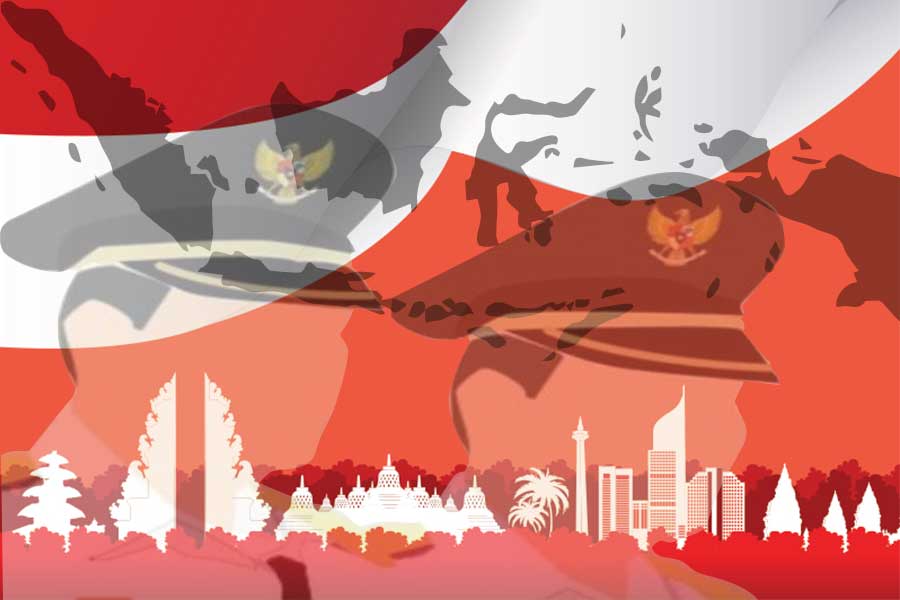The Role of Local Government in Maintaining the Unity of the Unitary State of the Republic of Indonesia

By: Prof. Dr. Drs. Ermaya Suradinata, S.H., M.H., M.Si Editor: Dhania Puspa Purbasari
It must always be remembered that building an effective local government is one of the main keys to maintaining the unity of the Unitary State of the Republic of Indonesia (NKRI).
In the context of Indonesia, which has vast territories and high diversity in culture, ethnicity, and religion, local government plays a very important role. With effective local government, the needs and aspirations of people in various regions can be better accommodated, creating balanced and equitable development throughout Indonesia.
Indonesia’s legal and constitutional framework also provides a strong foundation for decentralizing power, allowing for the distribution of authority between the central and local governments. Article 18 of the 1945 Constitution emphasizes that Indonesia is a unitary state with a principle of decentralization, allowing regions to have the authority to manage their own local affairs.
This is very important in the context of maintaining the unity of the NKRI because it provides space for regions to develop according to their potential and characteristics. Furthermore, Law No. 23 of 2014 on Local Government also regulates the division of authority and provides guidelines on how regions can manage and take care of local interests within the framework of the NKRI.
This law aims to create a responsive and accountable local government and encourage public participation in development. It is clear that effective local government can act as a bridge between local and national interests while maintaining the unity of the NKRI through inclusive and participatory policies. At the same time, local governments play an important role in improving the welfare of the local community.
By providing good public services such as education, health, and infrastructure, local governments can improve the quality of life and reduce socio-economic disparities between regions. Empowering the local community through participatory development programs can also increase the sense of ownership and involvement of the community in regional development, which is important to reduce the potential for horizontal and vertical conflicts that could threaten the unity of the NKRI.
The special autonomy policies granted to certain regions, such as Aceh and Papua, are efforts to respond to local demands and maintain the unity of the NKRI. This special autonomy gives these regions greater freedom to manage government and financial affairs, which is expected to accommodate the aspirations of the local community.
However, it must be acknowledged that the challenges in building effective local government are not insignificant. Corruption and poor governance at the local government level remain major challenges. Corruption hampers development and effective public services, which in turn can lead to public dissatisfaction and weaken social cohesion.
Development disparities between regions can also lead to a sense of injustice and trigger disintegration. Social and political conflicts at the local level, whether ethnic, religious, or economic, can also threaten the stability and unity of the NKRI. Therefore, local governments must be able to manage these conflicts through inclusive policies and constructive dialogue.
To enhance the role of local governments in maintaining the unity of the NKRI, there must also be an increase in the capacity and competence of local officials. Training programs and capacity-building for local officials must be continuously enhanced to ensure they can carry out their duties effectively and efficiently.
Additionally, increasing transparency and accountability in local government is a crucial step to prevent corruption and increase public trust. Involving the community in the planning and implementation of regional development ensures that the policies taken are in line with the needs and aspirations of the local community.
Effective local government can be at the forefront of responding to the needs and aspirations of local communities, which vary across regions. By providing autonomy and authority for regions to manage their own affairs, it allows regions in Indonesia to develop according to their potential and characteristics.
This autonomy not only gives regions the freedom to manage their own interests but also increases community participation in the governance and development process. However, the major challenges in implementing decentralization and regional autonomy include issues of corruption, inequality, and local conflicts. Therefore, appropriate policies and inclusive approaches are needed to address these challenges while ensuring that all regions receive equal attention in the distribution of resources and development.
Through strong and effective local government, the unity of the NKRI can be maintained and the welfare of the community can be continuously improved. Transparent, accountable, and responsive local governments to community needs will increase public trust and strengthen social cohesion.
Thus, local governments not only serve as a link between local and national interests but also as agents of change that can drive sustainable and inclusive development. Through effective decentralization, Indonesia can achieve better development equity, maintain the unity of the NKRI, and enhance the welfare of all Indonesian people.
Prof. Dr. Ermaya Suradinata, S.H., M.H., M.Si is the Governor of Lemhannas RI (2001-2005) and the Director-General of Social Politics of the Ministry of Home Affairs RI (1998-2000). He currently serves as the Chairman of the Advisory Board of the Center for Geopolitics & Geostrategy Studies Indonesia (CGSI), and Chairman of the Expert Council Team of the Agency for the Implementation of Pancasila Ideology (BPIP) RI.
